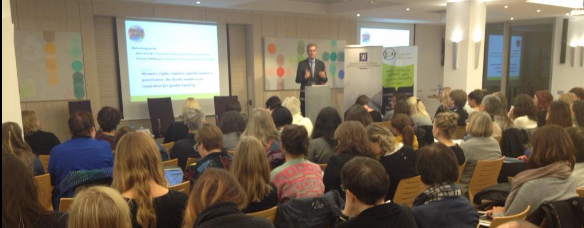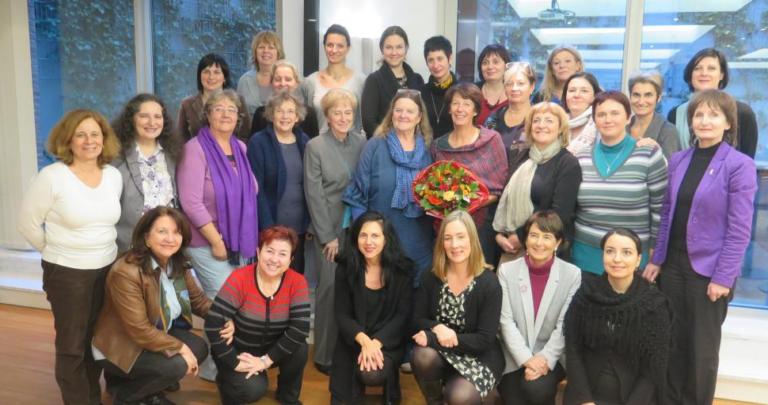[Brussels, 30 March 2012] On 28 March, the Center for Reproductive Rights (CRR) invited decision-makers, NGOs and health professionals to discuss the failure to facilitate contraceptive access in EU Member States as a human rights problem.
Lack of contraception coverage by public health insurance and lack of accurate information on contraceptives is a major problem for women in many EU Member States. Invited speakers gave a full picture of the situation in the EU, and informed the audience about international commitments and actions.
The speakers reminded that the right to contraception is a fundamental human right. In many countries, the liberalisation of abortion, together with access to contraception, has led to a decrease of maternal mortality. However, the discrepancy of national policies in this regards leads to a situation of inequality between women and girls in the EU, and should be addressed as an issue of justice and right to life.
The event, which aimed at raising political awareness on the issue, also gave the opportunity to Members of the European Parliament to issue an oral question to the European Commission on its policies related to reproductive health. In their question ‘Access to contraceptive services and information in EU Member States’, MEPs alert on the lack of available and comparable data on contraceptive prevalence and unmet need for contraception. They call on the EC to act to address the current barriers in accessing contraceptives and to develop initiatives as part of its policies on health and equality between women and men. Click here to read the full question, to which the EC is supposed to give an answer in due time.
The CRR has issued several factsheets about contraception, to which you can access by clicking here.
Click here to read CRR’s publication Calculated Injustice: The Slovak Republic’s Failure to Ensure Access to Contraceptives.
You can read a detailed report of the event in the CRR’s press release.
PRESS RELEASE
Millions of European Women Struggle to Access Contraception
Members of European Parliament Host Roundtable on Human Rights Violations, Gender Discrimination
03.28.12 – (PRESS RELEASE) Millions of women living in European Union member states still cannot access affordable contraception or even get accurate information about it — violating their human rights and discriminating against them because of their gender.
Three members of the European Parliament, along with support from the Center for Reproductive Rights, hosted a roundtable discussion today on how the EU can eliminate barriers to essential reproductive health care.
“Women across the globe have a fundamental right to decide if and when to have children,” said Nancy Northup, president of the Center for Reproductive Rights (CRR), a global legal organization dedicated to advancing women’s reproductive health. “Any government that places barriers between a woman and her right to contraception is violating her basic human rights. Every woman living within the EU —no matter where she lives or how much money she has — deserves a basic standard of reproductive health care.”
Today’s discussion was hosted by MEPs Mikael Gustafsson of Sweden, Sophie in‘t Veld of the Netherlands, and Katarína Neve?alová of Slovakia. Additional expert speakers included Dr. Gunta Lazdane, programme manager for sexual and reproductive health at the World Health Organization and Dr. Sheila McLean, emeritus professor of law and ethics in medicine at the University of Glasgow.
The majority of EU countries, including Spain, Germany, Romania, and United Kingdom, make birth control affordable and information about contraceptives readily available. Yet many countries are still operating in the dark ages when it comes to making common contraceptive methods accessible. For example, several countries do not include contraceptives in their public health insurance schemes, such as Austria, Bulgaria, Poland, Lithuania, and Slovakia.
In Slovakia, a 2011 report by the Center for Reproductive Rights and Slovak partners found that women’s right to reproductive freedom is largely ignored and violated. This a direct result of the poor quality of information, and the explicit ban, introduced in 2011, on covering contraception used solely for pregnancy prevention from public health insurance. Rather than upholding international standards, Slovakia considers contraceptives “lifestyle drugs” alongside drugs for weight loss or to quit smoking.
Cost is a huge barrier for low-income women. When a woman has limited income, she is forced to choose between paying for birth control and paying for other essential items — such as feeding her family or paying her rent. In addition, high costs for contraceptives hit adolescents and women in violent relationships particularly hard—since finances in their situations are often controlled by parents or abusive partners, respectively.
While equality between men and women is a foundational principle of the EU and, the EU Charter of Fundamental Rights establishes the right of access to preventive health care, women’s sexual and reproductive health has in the last years been largely ignored by the European Commission. Improving access to contraceptives is not included in efforts to reduce gender inequality, and data about the use and unmet need of contraceptives across the Union is inadequate or completely lacking.
“Today we will call on EU bodies and member states to take action on broadening access to contraceptives across the Union,” said Johanna Westeson, Regional Director for Europe at the Center for Reproductive Rights. “The EU has a strong mandate to fight both health and gender inequality, and ignoring women’s reproductive freedom will have serious consequences for women. It is high time that States showed their determination to tackle one of the root causes of inequality.”
Under international human rights law, states have an obligation to provide women with access to a full range of contraceptives and contraception information. According to a 2008 Guttmacher Policy Review, modern contraceptives reduce the number of unintended pregnancies and allow women to decide when to have children — thus preventing 215,000 pregnancy-related deaths and 2.7 million infant deaths worldwide each year.
Further, access to contraception enhances women’s opportunities for education and employment, and further supports their ability to provide adequate care, nutrition, housing, and education for their families.


